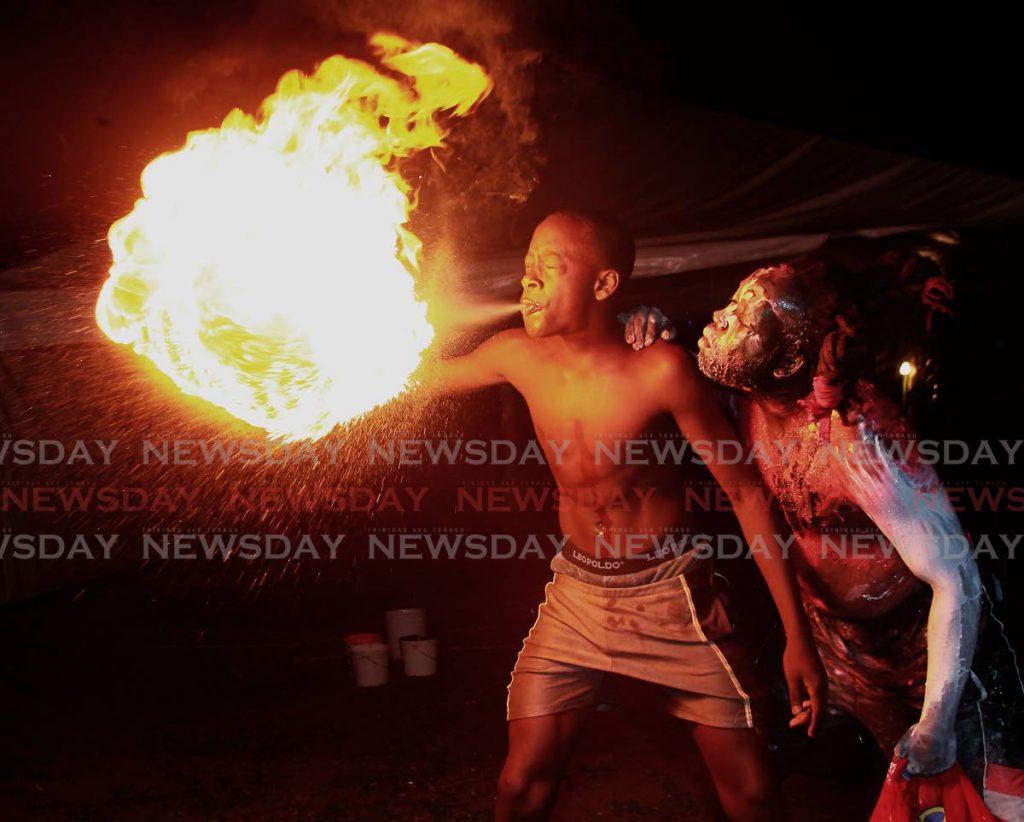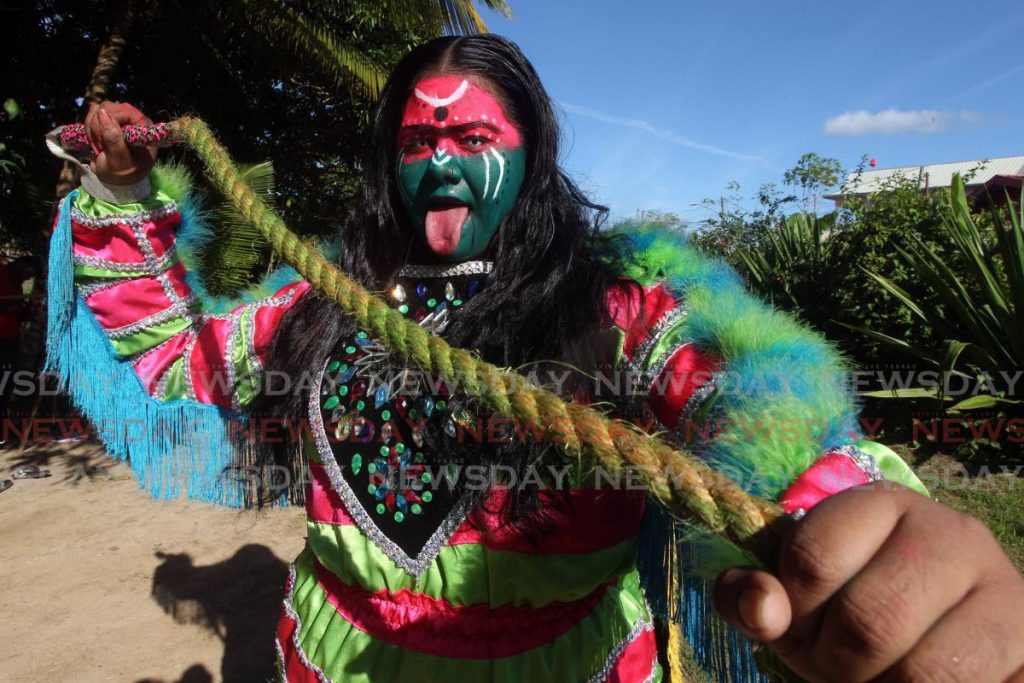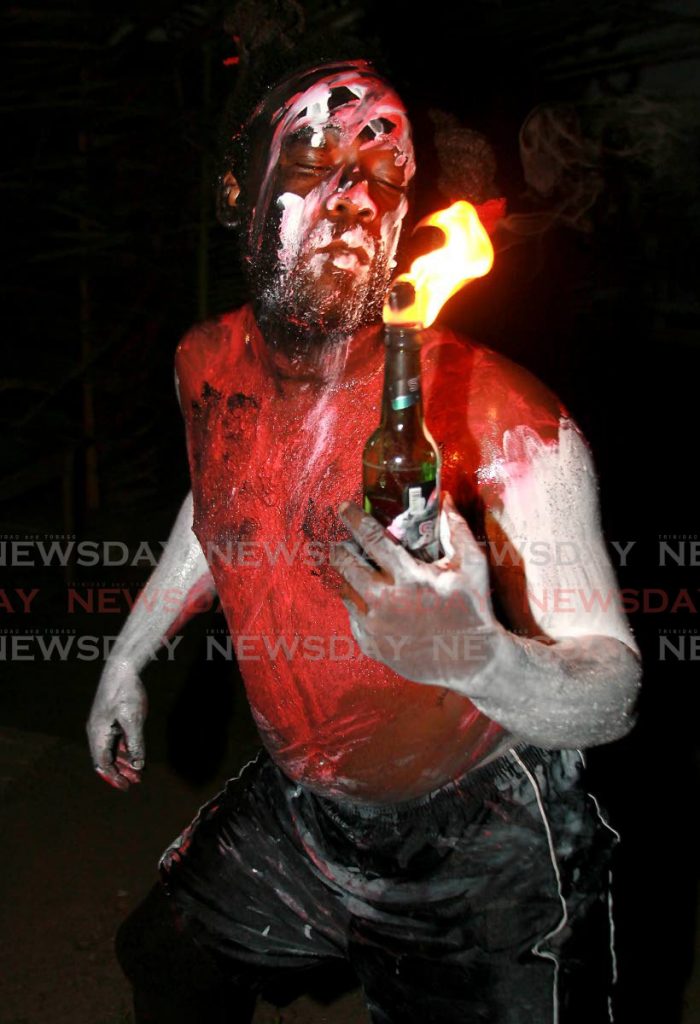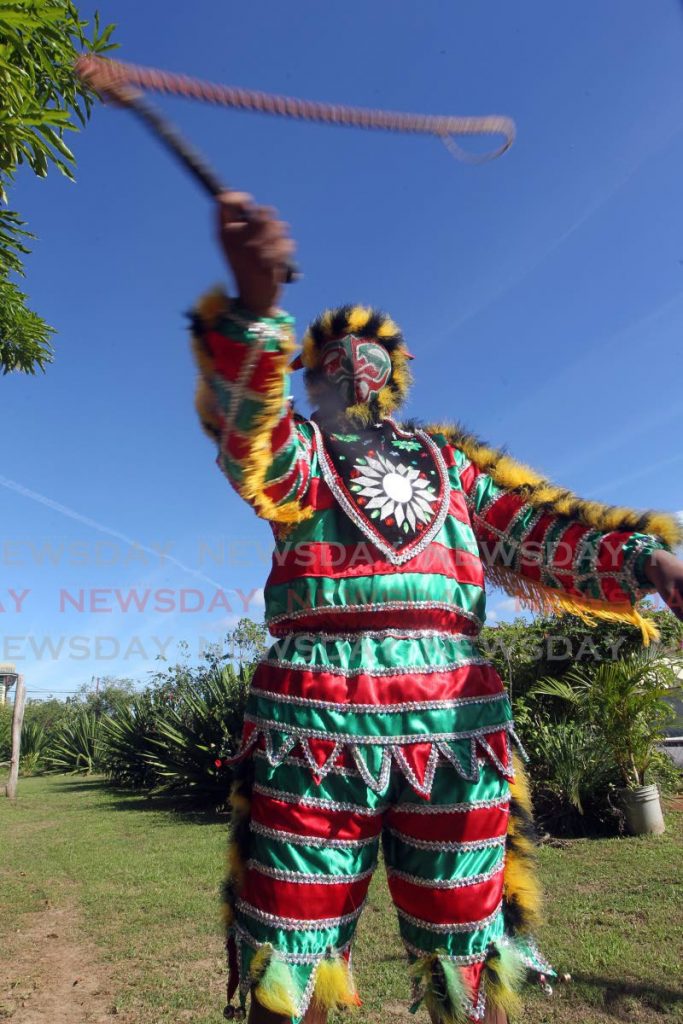Jab jab, devils keep Carnival rituals alive

Even though there is no Carnival this year, traditional mas players continue to prepare and maintain their rituals. For them, the festival is more than putting on a show for two days. It is an artform that has filtered into their daily lives.
Sunday Newsday caught up with the Original Jab Jab – the National Jab Jab of TT, or the Whip Masters, as they are known as, at their home in Perseverance, Couva. The group is now in the hands of the third generation of Alfreds. Ronald Alfred, 45, the king whip master, is the head of the group.
He said the jab jabs were maintaining the rituals of fasting and other traditions because it was their way of life.
“Our Carnival is different from everyone else’s. We started fasting, which is 40 days before Carnival, and we are going through the normal preparations by taking our bush medication and doing our ancestral prayers.
“We will have our bush bath on Carnival Sunday, but we just would not have a Carnival Monday or Tuesday this year. This is not a new thing for us.” If the festival was on, it would run from February 14-16.
For the the jab jabs preparing for the season includes prayers, the use of plants, and herbs for healing and strengthening the body, alcohol and sexual abstinence. At midnight on Carnival Sunday those who qualify to wield the whip take a bush bath in preparation for Carnival Monday's fight.

The style of fighting known as “Gatka” originated in South India. It is a traditional form of martial arts.
The rope jab fighters’ presence in Carnival has been strong, and became stronger after emancipation as indentured East Indian labourers were brought into the country. And while the fighters were predominantly of East Indian descent, elements of their clothing, such as protective mirrors, were also present in African stickfight attire.
Alfred said Carnival is the stage where they showcase their indigenous artform, one which he believed was making a comeback.
“There is more to it than the jump up and wine on Carnival that most people were accustomed to. This is something that we must do and will always do.
“Covid19 has not put a stop to our traditions, we continue to pay tribute to our ancestors. But covid19 is serious and we have to adhere to regulations but in place by the Ministry of Health and the government."
Asked whether they will have a virtual show, which other Carnival performers and promoters opted to do this year, Alfred said he was unsure.
He explained the event was more than going live on social media or other media. It is a competition, a fight between warriors.
“We are thinking about something, but the details were still being worked out, such as permission, regulation of people at the venue. The proposed venue was the Whip Masters yard.
“If we are doing something, we want to do it the proper way. We do not want people storming our venue. We will do what is necessary for the sake of the rituals.”
Loss of revenue
The Whip Masters has grown over the years and now has 65 members. But with Carnival cancelled, Alfred said it has been a financial challenge.
Although they received government aid, Alfred said it was insufficient to sustain his family and the band, as Carnival produced a major form of income.
He said they were not looking for handouts, but an avenue to expand and develop outside of the season.

“Covid19 intensified the need to expand outside of the Carnival season in a real and meaningful way. Our band is growing, and it has been financially tough to handle. I have been taking loans, I sold my cow, sheep and car over the years to try to keep the band on the road.”
Alfred said they proposed to the Ministry of Tourism, Culture and the Arts to establish a school and museum at the Whip Masters yard that is specific to traditional mas.
“People visit us from time to time. I give them a tour of the Whip Masters yard and explain the use of the herbs and how the whips are made.
“It is about sharing the knowledge so that the tradition can live on. All over the country our traditional mas is dying. If we can get a space to share our knowledge, it can be an income generator for traditional mas.”
He said they also had to find innovate ways to keep the artform going. New costumes, new performances and even places to perform had to be looked at.
“We are now finding people who are looking outside the box for unique entertainment. We have performed at weddings and birthday parties. This was not something that happened in the past, but as people understand us and not see our artform as something from the devil, we are getting more of these gigs.”
His sentiments were reinforced by the founder of Jab A Mien, Keon Eccles, who said there has been almost 85 per cent decline in income for the band. The jab molassie group operates out of Arouca. Eccles said that while covid19 has put a damper on the festivities, it was not crippling.
“We have to learn to innovate and explore new ways to do things. Covid19 has forced this upon us. We have included in our group, apart from the main character the jab molassie, the dame Lorraine, sailor, minstrel and baby doll and stickfighters.
“We also perform at weddings and birthdays and have had to innovate a bit to be brighter and more festive. So now you can find a pink jab molassie in some cases, in addition to the traditional black one.
“We offer what we know and to the best of our ability. With our training sessions too, we teach theory and practical in all that we portray. Our fee is $650.”
He explained this was necessary to sustain the band, which has about ten core members, but temporary members vary.
More than mas
Being a traditional form of martial arts, Alfred said training to become a whip master has many benefits and allows for personal development.
He said it required discipline – mental, physical and emotional – and also acted as a form of self-defense.
Over the years, the artform has evolved to include women. He said the training has been good for them, especially in cases of domestic violence.
“Women who have issues with domestic violence and other issues in life would take part and train with us. Apart from learning to defend themselves, they learn to deal with situations. We act as counsellors also.”

-
Whip Masters now has 18 women as members.
Alfred said it was also a place where troubled youths turn to for assistance with anger management or even finding a mentor or role model.
Eccles said his organisation also catered for youths and helped instill discipline which is key to developing the skills of the artform.
“We understand we do not know everything, and we need young, innovative minds on our team to assist us with development too. We include a 'big brother' mentorship teaching atmosphere."
Eccles said there are plans to do some shows virtually from their training ground in Arouca.
“Our thought this year is to keep it community-based, and give back to the community which has supported us over the years, if not financially, but through their tolerance of the noise we make.
“We are trying to do our part to also re-introduce ourselves to the younger members of the community. We are trying to keep it alive in our community.”
Both Whip Masters and Jab A Mien hope for assistance from the Ministry of Tourism, Culture and the Arts in documenting the traditional mas artform, before it is lost.
“This is our culture, this is our history. Locals need to understand it more for it to be saved, and in order for that to happen, there must be an avenue to find the information," Alfred said.
"It is hoped that there would be investments for a museum of traditional mas that can in collaboration with the University of the West Indies spearhead teaching and we can do the other things.”

Comments
"Jab jab, devils keep Carnival rituals alive"